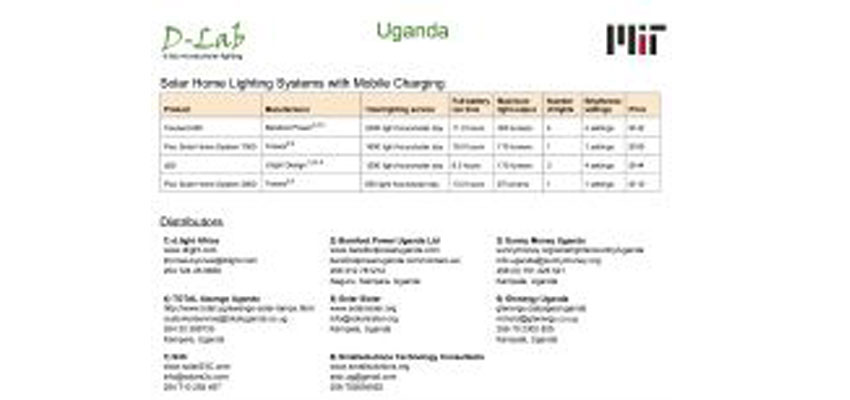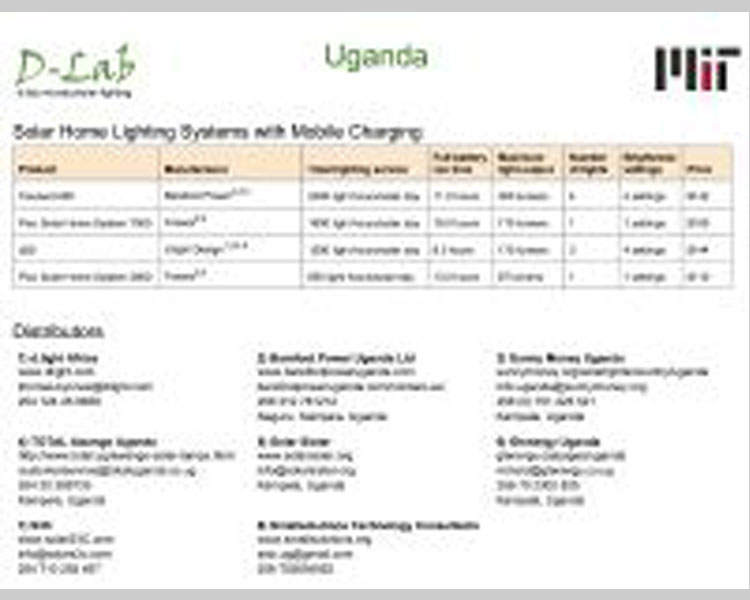
Chitti is a rising junior majoring in economics and international relations at Wellesley College. This summer she is working with MIT D-Lab's Food-Water-Energy Lead Eric Verploegen on a Solar Lighting Evaluation. She plans to take D-Lab: Development in the fall and is excited about everything she will learn in the class!
--------------------------------------------------
For the past six weeks I have been working with D-Lab's Eric Verploegen and the D-Lab's Energy Research Group on a Solar Lighting Product Comparison. The aim of the project is to facilitate end users’ purchasing of solar products by informing their product selections and providing the contact information for the product suppliers.
The need for solar lanterns
Roughly 20 percent of the world’s population does not have access to the electrical grid and thus relies on expensive, low quality, hazardous, polluting light sources such as candles, battery-powered flashlights, and kerosene lamps.
The market for off-grid lighting alternatives, specifically targeted at developing countries, has significantly grown over the years, yet kerosene lamps still serve as the main source of light for many people in the world today.
Despite the vast array of solar lanterns and home systems offered on the market, barriers such as asymmetric information, general lack of product awareness, and difficulty in access to capital among consumers can hinder market penetration.
Improving solar lantern information
There are several barriers preventing people who need and want solar lighting from obtaining it. Cost or access to financing, lack of information about what is available on the market, and not knowing how to determine which products best suit an individual’s needs are all such obstacles.
The countless solar lighting products companies have created offer a market based solution to those having to use expensive, low quality, hazardous, polluting light sources because they don’t have access to the grid. However, a market-based solution can only be effective if consumers know about what is available to them and how to obtain it.
The Solar Lighting Product Comparison aims to bridge this knowledge gap by aggregating and formatting the information about solar lighting products in an easy-to-read chart so that consumers will be able to compare products and features and make better purchasing decisions.
The project’s final output takes two different forms. The first is a database built through Google Sheets of a select 55 Lighting Global certified products, their comprehensive technical specifications, and their manufacturers and worldwide distributors.
Thanks to Eric Ferraiuolo’s scripting expertise, the database automatically displays if the listed specifications are out of date by dynamically sourcing the expiration date of a given product’s spec sheet from Lighting Global, making it easy to update so that information remains relevant.
Also thanks to Eric’s scripting, the database auto generates the second important output of the project: a series of country specific information sheets charting key technical specifications of solar products from the database that are available in a given country, as well as the contact information for their local distributors. Since the country specific sheets are targeted at serving end users, they are formatted as PDF files in order to be easily printed, circulated, and viewed on mobile devices.
The Solar Lighting Evaluation updates and expands on the Solar Lantern Suitability Evaluation published by the Comprehensive Initiative on Technology Evaluation (CITE) in 2013, no longer including water resistance as an attribute for comparison (as this is covered by the Lighting Global quality assurance program), and adding additional data from lab testing, such as direct, task, and ambient lighting tests. The solar home system component of the Solar Lighting Evaluation is the first to be conducted by D-Lab's Energy Research Group.



